32nd JAMCO Online International Symposium
February 2020 - March 2020
Messages for an Increasingly Divided World
Prospects for Multilingual Projects in the Republic of Armenia
Last year, under the theme of “Entrepreneurship and Business Management in Developing Countries and Conflict Zones, ” we shared with you our practices and challenges in the Republic of the Philippines and the Republic of Armenia, where we are engaged in business management. It has been almost a year since then, and the changes have been rapid, particularly in the situation of the Republic of Armenia.
On September 19, 2023, Azerbaijan announced that it launched an anti-terrorist operation in Nagorno-Karabakh, a disputed territory with Armenia. They have launched an attack on the region that is under the effective control of Armenians and demanded that the illegal Armenian military forces should hand over their weapons and dismantle the unlawful regime.
The Armenian forces, unable to obtain support from the Armenian government, accepted Azerbaijan’s demands and surrendered on September 20. Azerbaijan declared that it had restored sovereignty over Nagorno-Karabakh within 24 hours of the start of the military action.
Nagorno-Karabakh, the disputed territory, has about 120,000 Armenian residents. However, the day after the Armenian military surrendered, the residents began evacuating to the Armenian side. By the end of September 2023, approximately 100,000 Armenians had evacuated.
Since many of the Armenian residents from Nagorno-Karabakh have evacuated to the Armenian side, Azerbaijan has been promoting its effective control of the region; however, if a peace treaty is signed between the two countries in the future, it would put an end to the 30-year war over the disputed land.
The sentiment of the Armenian people can be inferred from their words “land is blood”—they cannot give up easily for their territory is marked by blood being spilled by their people.
However, wars and conflicts are nothing but bottlenecks for the development of a country or a region. With the conclusion of a peace treaty and the resolution of the territorial issue with Azerbaijan, although it would leave Armenia with the problem of relocating Armenian residents from Nagorno-Karabakh and such, and their domestic economy will remain sluggish for a while, we believe that they will overcome these difficulties and have the potential to grow dramatically in the future.
As we take into consideration the impact of the protracted war between Russia and Ukraine and the large number of people with rich language skills, etc. amid domestic conflicts in Armenia, we would like to discuss the prospects of a multilingual business in the Republic of Armenia using our company’s business in the country as a case study.
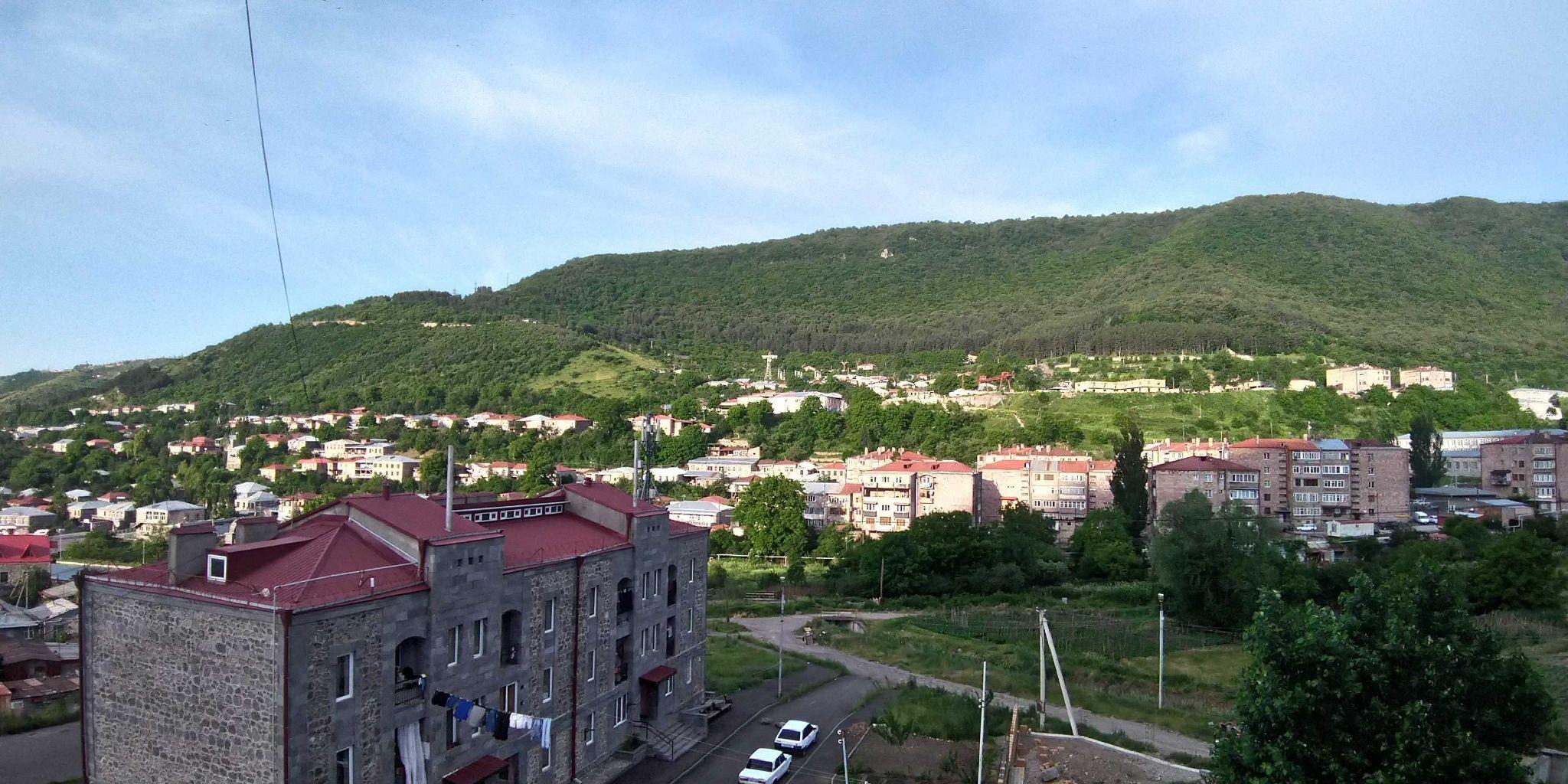
In Goris, a town on the border with Nagorno-Karabakh Photo by the author

Evacuees from Nagorno-Karabakh Photo by the author
About Armenia
I am sure that not many Japanese can immediately answer its exact location or by saying “Oh, that’s the country famous for _____ !” when they hear the country “Armenia”. Even I, who have been establishing a base and developing business in Armenia since 2019, need to be a little creative in explaining. So, first, I will start by giving you some general information about Armenia. According to information published by the Japanese Ministry of Foreign Affairs, the Republic of Armenia is a country located in the Caucasus mountainous region between Asia and Europe, and is a member of the former Soviet Union. It declared its independence back in 1991.
Its population is 2.8 million (from 2023 United Nations Population Fund). It covers an area of 29,800 square kilometers (about 1/13th the size of Japan), about the same size as Tokyo, Kanagawa, Saitama, Chiba, and Tochigi combined. Their official language is Armenian. Armenia is also famous for being the first country in the world to welcome Christianity back in 301 AD.
Geographically, Armenia is a landlocked country between Turkey to the west, Azerbaijan to the east, Iran to the south, and Georgia (formerly Gruziya) and Russia to the north. It maintains good relations with Russia, Georgia, and Iran. However, due to the Armenian genocide during the time of the Ottoman Empire with Turkey and the Nagorno-Karabakh conflict with Azerbaijan, Armenia does not have diplomatic relations with these countries.
Their primary industries are agriculture, gemstone processing (diamonds), and information technology. As a response to the country’s declining population, Armenia is now focusing on the revival of technology and IT industries cultivated during the former Soviet Union period, committed to becoming an IT-oriented country.
We can also confirm from the World Bank statistics that its GDP growth since 2010 witnessed a boost of an average of about 5%, with the most recent average of about 7% from 2017 to 2019. Although 2020, a year where COVID-19 wreaked havoc on the world, saw a negative growth of -3.3 %, Armenia showed its quick recovery from COVID-19, recording a 5.8% growth in 2021 and an astounding recovery of 12.6% in 2022, boasting its extremely high potential and robust activity.
In fact, since 2000, the world’s largest IT companies, including Synopsys, National Instruments, Microsoft, Oracle, Amazon, IBM, Picsart, Cisco, D-Link, Samsung, and others, have started to invest and expand their business in Armenia, contributing to the employment of local IT engineers.
On the other hand, the Embassy of Japan in Armenia was only just established in 2015. But as far as I am aware, besides our company (CCC International LLC), JTI (Japan Tobacco Inc.) is the only other Japanese company in Armenia as of 2023.
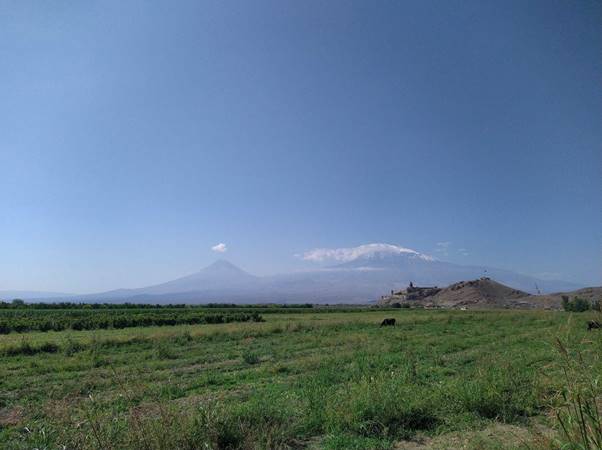
Mount Ararat, a symbol of the Armenian spirit (5,137m above sea level) Photo by the author
Domestic Impact of the War between Russia and Ukraine
Previously, we wrote that Armenia’s GDP growth rate has been recorded at 12.6% in 2022 (from World Bank). This, however, is deeply related to the war between Russia and Ukraine.
According to the World Bank’s report, the reason why Armenia achieved remarkable economic growth and became the fastest-growing country in Eastern Europe and Central Asia in 2022 was due to the facilitation of immigrants primarily from Russia, Ukraine, and neighboring countries and regions, a flux of Russian companies, and increase in capital, following Russia’s invasion of Ukraine.
In fact, since the Russian invasion of Ukraine on February 24, 2022, many Russians have been moving to Armenia, where visas are not required for entry. And based on the report of Moscow Times, a Russian newspaper, the number of Russians arriving in Armenia from January to June 2022 reached up to 372,086 according to the official records of the Armenian government, more than 100% from the 156,496 recorded in the same period last year.
They also noted that after President Putin announced the partial mobilization of reserve officers and signing of the decree on September 21, 2022, more than 132,000 Russian citizens arrived in Armenia in September alone, and 128,000 left the country in the same month. While approximately 39,000 Russians remained in Armenia, Russians are making significant changes in the country.
One of the changes is the skyrocketing cost of living. The country as a whole has a population of 2.8 million, and the capital city of Yerevan is estimated to have about 1 million people. However, due to the influx of people, approximately. 1.4% of the country’s population and 4% of the capital city’s population at once, the real estate prices in Yerevan rose by 20%, and the rental prices have also risen across the board. Because of that, residents would be driven out of the city area for being incapable of renewing their leases on apartments and condominiums.
Next is the influx of Russian companies into Armenia. After Russia invaded Ukraine, economic sanctions were enforced by Europe and America. The exclusion of leading Russian banks from the Society for Worldwide Interbank Financial Telecommunications (SWIFT) in particular has made it difficult for companies to settle international transactions. In response to this, Russian companies have been taking steps to avoid sanctions by relocating or opening new offices in Armenia, which is a member of SWIFT, allowing transactions in U.S. dollars (USD), while maintaining strong ties with Russia economically.
And last is the appreciation of Armenia’s currency. Since Russia’s invasion of Ukraine, major countries have had a trend of the U.S. dollar (USD) appreciating over their currencies. However, for Armenia, the AMD (Armenian dram) appreciated while the USD depreciated. On a related note, the trading demand for the Russian ruble has also increased. Between February 2022 before the military clash and October 2022 just eight months later, the exchange rate from 480 AMD to 1 USD changed to 400 AMD to 1 USD. The AMD had appreciated 20% more and has not dropped since even to this day.
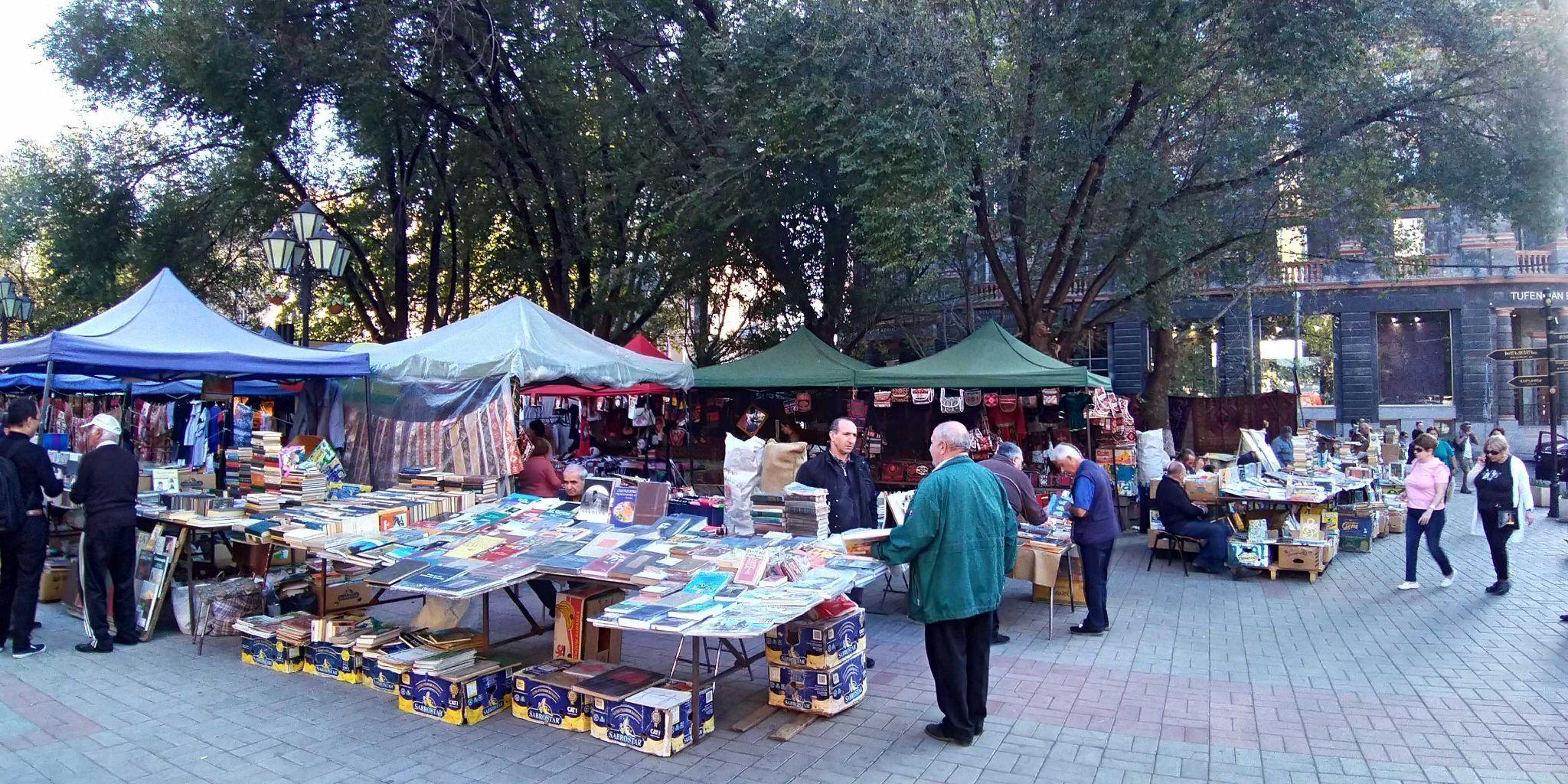
In Yerevan, the capital city Photo by the author
Reasons and Background of a Large Number of Human Resources with Rich Language Skills
Our main business in Armenia focuses on translation and AI-voice recognition services centered around popular sub-cultures such as anime, manga, and video games. Since last year, the number of languages we can cater to has increased by five countries, and we are now a company that can handle more than 35 languages at any given time.
For example, for one of our clients, a Japanese game company, we provide customer support and translation services for Japanese games to FIGS (French, Italian, German, Spanish). Also, the number of translation requests we received for language pairs that do not involve Japanese has been increasing in recent years. We have offered our services to the largest company in the webtoon (vertical reading manga) industry to translate into multiple European languages, including but not limited to Korean-to-German, and Korean-to-French translations. Our services were also availed by an American IT company in translating AI and speech-recognition including Eastern European languages and FIGS.
A large number of human resources with multilingual skills in Armenia is an advantage to us; however, the reasons why such skills are prevalent among Armenians is deeply related to the country’s history.
The first thing we would like you to know is the existence of a diaspora. It is estimated that there are approximately 7 to 9 million Armenians abroad, compared to a domestic population of 2.8 million.
Armenians abroad are generally referred to as diaspora. The representative countries to which they have migrated are Russia with 2.5 million in the numbers, the United States with 1.5 million, and France with 600,000, to name a few. As a side note, the number of Armenians living in Japan is 63, based on the statistical data of foreign residents published by the Japanese government (from December 2018).
As to why there are so many diasporas in Armenia, unlike Japan, which is an island nation, the Armenian Highlands which stretches to the north of Mesopotamia, is geographically a crossroads between east, west, north, south, and was also an intersection for Asian and European civilizations and religions represented by Christianity and Islam. These have resulted in a history of being dominated and subjugated by ancient Greece, the Arab Empire, the Russian Empire, the Ottoman Empire, the Persian Empire, and the Mongolian Empire.
Due to the historical issue of the Armenian Genocide by the Ottoman Empire, the issue of diplomatic relations and historical awareness with Turkey remains unresolved to this day. We believe that 1.5 million people were killed during the Ottoman Empire’s genocide against the Armenian inhabitants that began in 1915.
This harsh and tragic historical background has resulted in the dispersion of many Armenians abroad, creating diasporas three times larger than the size of the domestic population. We can say that the migration of so many Armenians abroad inevitably led to an increase in the number of people acquiring the language of the destination country.
In addition, Russia still has strong political and economic ties with Armenia, for Armenia was a member of the former Soviet Union. Aside from both countries being able to come and go without a visa, there are no strict restrictions on employment as well.
Furthermore, people born before the collapse of the Soviet Union were educated in the Soviet style, so they can still speak Russian without difficulty. Although the number of young people who speak English is increasing, there are still many people who understand Russian.
Though we have previously mentioned that there are approximately 7 to 9 million Armenians living abroad, many of them have found success. Diasporas and their descendants are active in various fields around the world: to name just a few, former professional tennis player Andre Agassi (father is of Armenian descent), chanson singer Charles Aznavour (mother is of Armenian descent), politician and former California governor George Deukmejian (both parents were Armenian), actress and model Kim Kardashian (father is of Armenian descent).
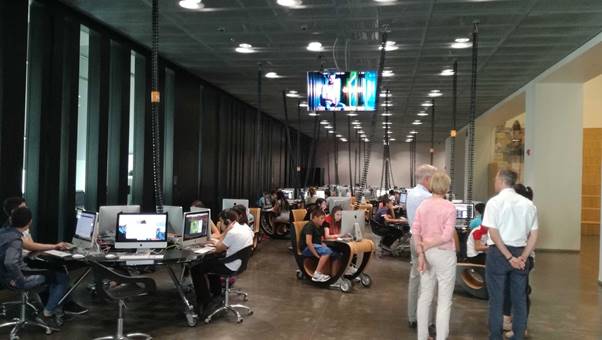
Children learning IT for free at the Tumo center established by the Diaspora in Armenia Photo by the author
Prospects for Multilingual Business Utilization
The Philippines and Armenia, where our companies are based, though having different historical backgrounds, bear several similarities. For example, both countries have large diaspora populations, with the Philippines having approximately 10 million people which is more than 10% of its population, and Armenia having approximately 7 to 9 million people who have worked or settled abroad.
Their similarities can also be seen in many domestic and international issues, such as Armenia with Azerbaijan on the Nagorno-Karabakh issue and Turkey on the issue of historical recognition over the Genocide; the Philippines with China on the issue of the Spratly Islands and the South China Sea, and a domestic conflict between government and Islamic rebels in Mindanao.
However, the language skills of the people in both countries are very high. In Armenia, it is common to find trilinguals who speak Russian, English, French, and other languages in addition to their native Armenian. As for the Philippines, it produced many citizens who understand English, Spanish, and other languages in addition to their native Filipino.
As for us, we will continue to increase the number of languages we can cater to in both countries, which is abundant in multilingual human resources with high potential in such languages. While increasing the number of subculture-related translation and AI voice recognition services, such as anime, manga, and games, which are our forte, we will also take on a variety of language-related projects to contribute to the creation of employment opportunities and cross-cultural understanding in the region as a general language trading company.
As a Japanese-affiliated company, we will also directly connect Japan’s regions and local communities, which have built wonderful traditions and culture but are experiencing a decline in tax revenue and economy due to population decline and depopulation, with the rest of the world to create inbound and outbound demand. We would also like to develop services that can assist in the areas of sales and marketing in regional and local areas of Japan by taking advantage of our abundant multilingual human resources.
In the field of inbound sales and marketing, we will especially strengthen and promote inbound tourism and measures for regional and local areas of Japan since we transferred our travel agency business in 2021. As for the field of outbound sales and marketing, we are planning to promote businesses that encourage Japanese and Japanese-affiliated companies to shift their attention to overseas, such as making Japanese traditions, culture, products and services available in multiple languages, organizing local business meetings, giving lectures, and offering overseas study and internship programs.
Today’s World, Said to Be in Danger of Fragmentation
I have shared with you our company’s business development in utilizing multilingual human resources while taking into account the domestic situation in Armenia. However, I would like to conclude this by reflecting a little on what it means to have a large number of human resources who can handle multiple languages and to already have an environment in which people are learning multiple languages in today’s world which is said to be in danger of fragmentation.
Though I have mentioned in the previous section why there are so many Armenians with rich language skills and backgrounds, another reason is that these skills have grown as a means of survival in a harsh and tragic history of domination and subordination. Furthermore, there are many diasporas abroad that have taken root in the countries and regions to which they have emigrated, acting as good citizens and even playing an active role in the world. In other words, if we consider Armenia as an example, the keywords to overcome or improve the division may be: to understand multiple languages, understand different cultures, get an education, become good citizens, emigrate abroad, experience abroad, etc.
According to Ethnologue (SIL International, a Christian study organization for lesser-known languages), which has been called an encyclopedia of the world’s languages, there are currently 7,168 languages in the world.
Of these, 492 languages have developed to the point where they are used and maintained by institutions beyond the family and community framework, and 3,593 languages that are not maintained by a formal institution but are still learned by children and used at home. And there are 3,072 endangered languages of which are growing to be uncommon for children to use and learn, and 451 extinct languages in which the language is no longer used and no ethnic identity is associated with.
As a company that handles a wide variety of languages, we have many staff members of various nationalities, religions, and backgrounds. We will continue to expand our language services and expand the number of language-related projects to increase employment, develop business leaders, and contribute to countries and regions through our corporate activities. We will also promote the use of multiple languages to contribute to activities that deepen mutual understanding and appreciation of different cultures.
Finally, I would like to thank you all for giving me the opportunity at the JAMCO Online International Symposium again this year to introduce our company, which operates in Armenia, an unknown country in the Caucasus region that is not so familiar to Japanese people, and Armenia itself. I would also like to thank all of you who have read this article to the end, even though it is poorly written.
I would be very happy if this article would trigger your interest in the country of Armenia. Thank you very much.
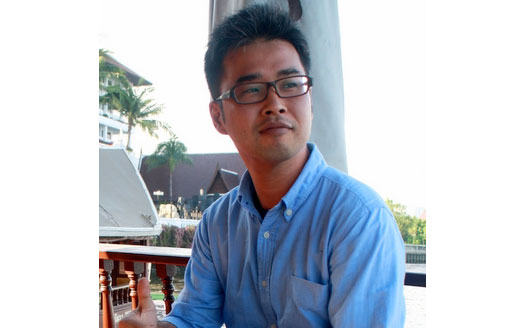
Daisuke HASEGAWA
Daisuke HASEGAWA
Entrepreneur/Manager
Established and managed Creative Connections & Commons Inc. (Philippines), an anime, manga, and game translation and customer support company
Established and managed CCC International LLC (Armenia), CCC's European base
Established and managed Pistacia, Inc., an IT development, human resources, and Davawatch, a Davao information portal
Acquired and managed Hello World Tours (Philippines), a travel agency
Established and managed KID-T GROUP HOLDINGS Co., Ltd (Malaysia), a holding company
Member of the Board of The Japanese Chamber of Commerce of Mindanao, Davao City Chamber of Commerce and Industry, and member of the Japan Translation Federation
Born in Tokyo, Japan
Former employee of NGO (international cooperation)
Lives in Davao City, Philippines
Favorite Quote: Anything one man can imagine, other men can make real. Think outside the box.
 Return to 32nd JAMCO Online International Symposium contents page
Return to 32nd JAMCO Online International Symposium contents page








